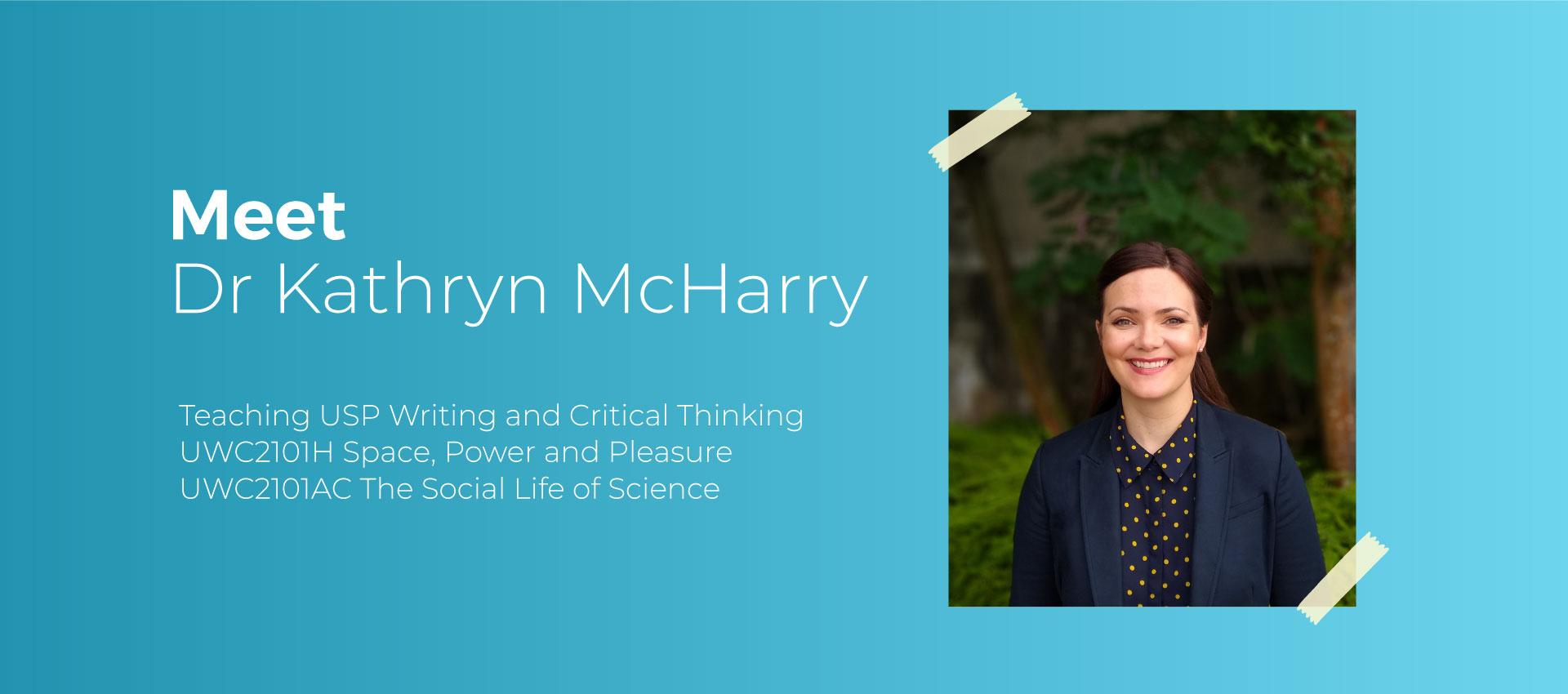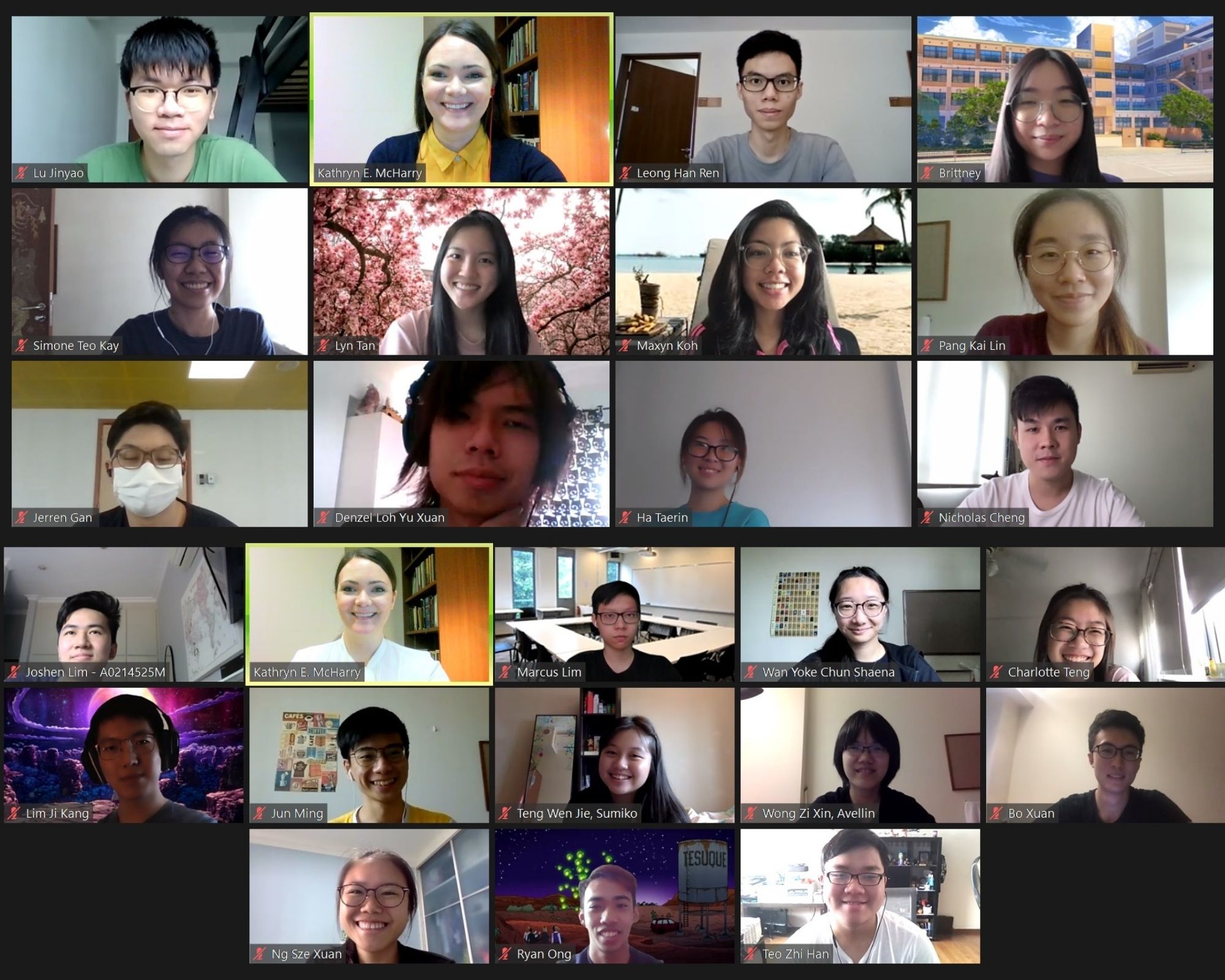From Science Studies to the Supernatural: Introducing Dr Kathryn McHarry
By Jen Chik Hui Xin (English Literature + USP, Class of 2022)
Jen is a student writer for USP Highlights.
Published: 8 January 2021
Meet Dr Kathryn McHarry, who joined the USP community amidst the COVID-19 pandemic and social distancing measures. In typical social distancing fashion, student writer Jen Chik (English Literature + USP, Class of 2022) sat down with Dr McHarry in virtual space over Zoom call to find out more about her interests and what makes her tick.

Having joined the USP community in the midst of the pandemic in July 2020, Dr McHarry describes herself as being just as new to Zoom education as the rest of her freshmen Writing and Critical Thinking (WCT) students. Both professors and students alike struggle with adapting to the changes of online learning bring, but despite the learning curve, Dr McHarry reflects that the upside was the opportunity to come together and work through some of the challenges of Zoom learning, and of course to have a good laugh about some of its peculiarities.
Dr McHarry is trained as a socio-cultural anthropologist, having done her graduate work at the University of Chicago. Her areas of specialisation focus on global childhood and post-millennial transformations of care, labour, and capital. When I looked slightly puzzled, Dr McHarry elaborated that although her interests sound abstract, they lie in what can be broadly described as the “economisation of life”, and how science and technology are used to govern family life. Her dissertation, for instance, was on early childhood care and education policy and investigated how governments are now trying to build human capital in children, as well as the effects of these programmes on everyday life. More importantly, Dr McHarry maintains that her research always tries to connect overarching global policy concerns or international mandates with the more down to earth, “kitchen-sink level” of impact which touches the everyday life of people.
Aligned with her interests, Dr McHarry’s module titled “UWC2101H Power, Space, and Pleasure” is a revision of a pre-existing module that focuses on how technoscience affects power, space, and our experience of pleasure. Dr McHarry points toward the history of the Botanic Gardens as one example of how technoscience is conflated with power, space, and pleasure. While the Singapore Botanic Gardens stands today as an important contemporary research institution, it also must be considered for its role in the colonial economy, since indigenous knowledge of botany was influential for Western botanic knowledge. Thus, the Botanic Gardens is not only a place we go for picnics or to simply enjoy, but also a place that holds an important position within the history of science.

In this upcoming Academic Year 2020/21 Semester 2, Dr McHarry has a new WCT module titled “UWC2101AC The Social Life of Science”. It will explore how scientific knowledge, as a fundamentally human endeavour, is shaped by the social contexts in which it is practised and shared. It will be well-suited for students who are interested in the history and anthropology of science, as well as those who hope to pursue a STEM career and are curious about how scientific communities function.
It is this exploration of the social context of science, and understanding science from an anthropological perspective, that makes up the interdisciplinary nature of Dr McHarry’s modules. Her classes gravitate towards learning to see scientific communities as communities, to recognise the human context and history which informs scientific research and inventions—in order to think critically about the impact that technology and new scientific discoveries have on our lives. Why is this important? “I’m really interested in getting my students to think about how technology is all around them, shaping the world that they live in and shaping their lives. Technological advances are so rapid, and it seems as if there is a new gadget and gizmo emerging every day, there is always new science that seems to tell us new things about the world and it can be hard to keep track of it. So, it’s good to pause and reflect critically on how those things are changing our lives.”
Though new to USP, Dr McHarry is no stranger to Singapore and in fact quite a global citizen. She professes, “I am absolutely fascinated by learning about the diverse ways people live, and in different ways than me that I wouldn’t necessarily understand. I love to travel, to learn new languages, and to meet new people.” Indeed, Dr McHarry’s capacity as an anthropologist has taken her all over the globe, to nearly every part of the world save for South America and Antarctica. The geographic focus of her anthropology work has been, until recently, West Africa and in particular Senegal. She conducted field research in Senegal from 2008-2012, and her longest stay lasted almost two years. Anthropology as a field has allowed Dr McHarry to study what she terms “all of the social sciences”, since she is able to immerse herself in the place and learn everything about it – from the way people live, to what they read, what kinds of languages they speak, what their history has been, what kinds of art they make, and what economic patterns they have. Up till COVID-19 happened, Dr McHarry made it a point to try to get away to some place nearby whenever she could, such as to Bali or Thailand or Malaysia.
Other than travelling, Dr McHarry also lists reading as one of her hobbies. “I like to read quite a bit which is funny,” she chuckles, “because I read a ton for work.” The reason for this hobby, though, surprised me. “A number of the mentors I’ve had have advised me that if you want to be a good writer, or if you want to be passionate about writing, the thing to do is read novels. Tackling fiction literature is a great way to expand your vocabulary and to open your imagination to the process of playing with words and creating meaning that captures intent, as well as teaching you to refine expression.”
Dr McHarry’s favourite genre? “I like historical fiction, magical realism, and the supernatural.” She confesses that she loves gothic novels, and I jokingly suggest that she should offer a module on the supernatural someday. Who knows? After all, Dr McHarry explains that “the supernatural draws attention to what it means to be human.”

Besides the new module that Dr McHarry is offering in AY20/21 Semester 2, USP students can also look forward to the following new modules offered by some of our favourite professors as well as an existing Quantitative Reasoning module on the timely topic of Epidemics, offered by Dr Loo Yoke Leng, the latest to join USP!
by A/P Don Favareau
by A/P Quek Ser Aik
by Dr Loo Yoke Leng

